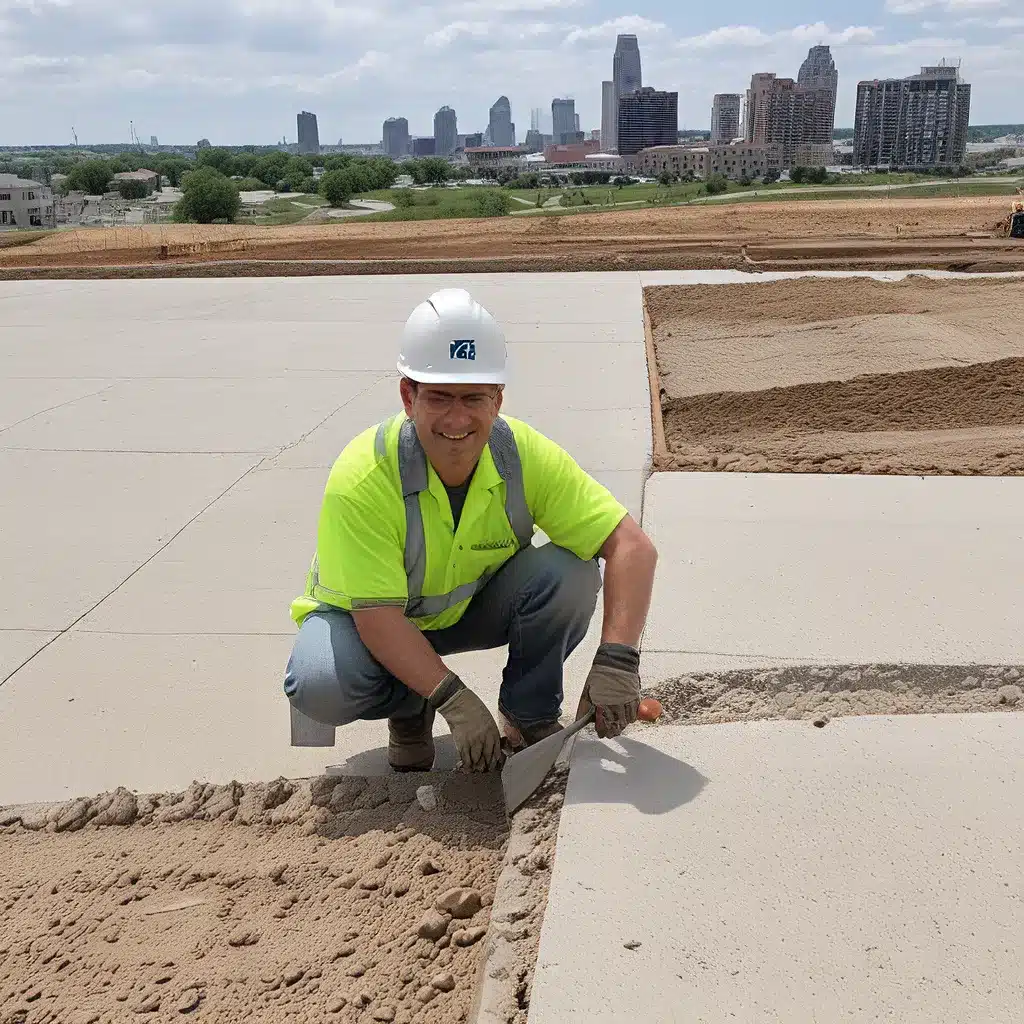
In the heart of the Midwest, Kansas City has long been a thriving hub for the construction industry, with a rich history of concrete contracting services supporting the development of residential, commercial, and infrastructure projects. However, as the world embraces the Green Revolution, the concrete industry in Kansas City is undergoing a profound transformation, driven by the need to adopt more sustainable and environmentally-friendly practices.
Embracing Sustainable Concrete Solutions
The White House has taken a leading role in catalyzing the clean energy industries and jobs through its recent Executive Order on Catalyzing Clean Energy Industries and Jobs. This directive sets ambitious goals for the federal government to lead by example, including achieving 100% carbon pollution-free electricity and a net-zero emissions building portfolio by 2045.
For concrete contractors in Kansas City, this shift towards sustainability presents both challenges and opportunities. Concrete, a staple material in the construction industry, has traditionally been associated with a significant carbon footprint due to the energy-intensive production process of its primary ingredient, cement. However, innovative green concrete solutions are emerging, offering ways to reduce the environmental impact of concrete while maintaining its durability and structural integrity.
Innovative Green Concrete Solutions
One of the key approaches to greener concrete is the use of supplementary cementitious materials (SCMs), such as fly ash, slag, and silica fume, which can partially replace traditional cement in the concrete mix. These SCMs not only reduce the carbon emissions associated with cement production but also enhance the concrete’s performance, making it more durable and resistant to environmental stressors.
| Material | Reduced Carbon Emissions | Improved Concrete Properties |
|---|---|---|
| Fly Ash | Up to 30% reduction in cement use | Increased strength, durability, and resistance to chemical attack |
| Slag | Up to 50% reduction in cement use | Improved resistance to sulfate attack and reduced heat of hydration |
| Silica Fume | Up to 10% reduction in cement use | Enhanced compressive strength, reduced permeability, and improved resistance to chemical attack |
In addition to SCMs, recycled concrete aggregates are gaining popularity in Kansas City’s construction industry. By repurposing concrete waste from demolition or construction sites, contractors can reduce the demand for virgin aggregate materials, further lowering the environmental impact of concrete production.
Embracing the Green Revolution
The U.S. Green Building Council (USGBC), a leading authority in sustainable construction, has been instrumental in promoting green building practices through its LEED (Leadership in Energy and Environmental Design) certification program. LEED-certified projects in Kansas City showcase the city’s commitment to sustainability, with buildings like the USGBC’s own headquarters achieving the highest Platinum certification.
As concrete contractors in Kansas City embrace the Green Revolution, they are not only responding to the White House’s directives but also catering to the growing demand from homeowners and businesses for eco-friendly construction solutions. By leveraging innovative concrete technologies, such as carbon-neutral concrete and self-healing concrete, these contractors are positioning themselves as industry leaders in sustainable building practices.
Partnering with Sustainable Concrete Contractors
When choosing a concrete contractor in Kansas City, it’s essential to look for companies that prioritize sustainability and environmental stewardship. Look for contractors who:
- Utilize Sustainable Concrete Mixes: Inquire about the use of SCMs, recycled aggregates, and other green concrete solutions to reduce the carbon footprint of your project.
- Implement Waste Reduction Strategies: Ask about their approach to construction waste management, including recycling and repurposing of concrete waste.
- Prioritize Energy-Efficient Operations: Ensure the contractor’s equipment and processes adhere to energy-efficient standards, minimizing the environmental impact of their work.
- Demonstrate Commitment to Sustainability: Look for contractors who actively participate in LEED or other green building certification programs and have a track record of eco-friendly projects.
By partnering with a sustainable concrete contractor in Kansas City, you can not only ensure the quality and durability of your project but also contribute to the city’s efforts in combating climate change and promoting a greener future.
Conclusion
The concrete contracting industry in Kansas City is at the forefront of the Green Revolution, embracing innovative solutions and best practices to reduce the environmental impact of construction. By leveraging sustainable concrete technologies, recycling construction waste, and prioritizing energy-efficient operations, these contractors are paving the way for a more sustainable future in the heart of the Midwest.
As homeowners, businesses, and government agencies in Kansas City continue to demand eco-friendly construction services, the concrete industry is poised to lead the charge in driving the city’s transformation towards a greener, more resilient built environment. By choosing a sustainable concrete contractor, you can not only enhance the quality and longevity of your project but also contribute to the larger goal of creating a more sustainable Kansas City.
Concrete Contractor Kansas City is committed to providing high-quality, eco-friendly concrete solutions that meet the evolving needs of the community. Contact us today to learn more about our sustainable concrete services and how we can help you achieve your construction goals while making a positive impact on the environment.

